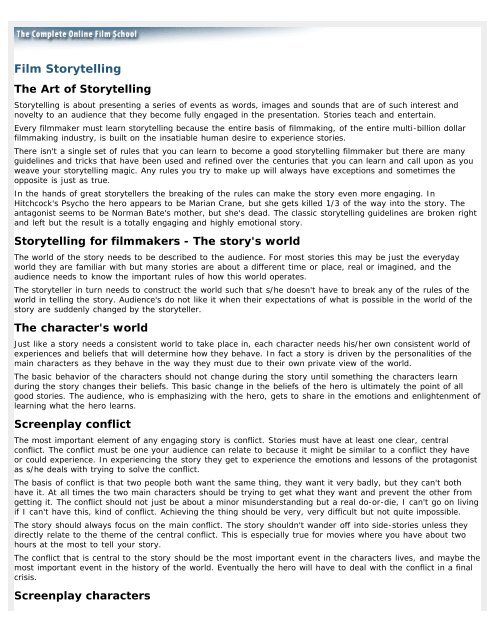The Complete Online Filmmaking Reference - Film Distribution ...
The Complete Online Filmmaking Reference - Film Distribution ...
The Complete Online Filmmaking Reference - Film Distribution ...
Create successful ePaper yourself
Turn your PDF publications into a flip-book with our unique Google optimized e-Paper software.
<strong>Film</strong> Storytelling<br />
<strong>The</strong> Art of Storytelling<br />
Storytelling is about presenting a series of events as words, images and sounds that are of such interest and<br />
novelty to an audience that they become fully engaged in the presentation. Stories teach and entertain.<br />
Every filmmaker must learn storytelling because the entire basis of filmmaking, of the entire multi-billion dollar<br />
filmmaking industry, is built on the insatiable human desire to experience stories.<br />
<strong>The</strong>re isn't a single set of rules that you can learn to become a good storytelling filmmaker but there are many<br />
guidelines and tricks that have been used and refined over the centuries that you can learn and call upon as you<br />
weave your storytelling magic. Any rules you try to make up will always have exceptions and sometimes the<br />
opposite is just as true.<br />
In the hands of great storytellers the breaking of the rules can make the story even more engaging. In<br />
Hitchcock's Psycho the hero appears to be Marian Crane, but she gets killed 1/3 of the way into the story. <strong>The</strong><br />
antagonist seems to be Norman Bate's mother, but she's dead. <strong>The</strong> classic storytelling guidelines are broken right<br />
and left but the result is a totally engaging and highly emotional story.<br />
Storytelling for filmmakers - <strong>The</strong> story's world<br />
<strong>The</strong> world of the story needs to be described to the audience. For most stories this may be just the everyday<br />
world they are familiar with but many stories are about a different time or place, real or imagined, and the<br />
audience needs to know the important rules of how this world operates.<br />
<strong>The</strong> storyteller in turn needs to construct the world such that s/he doesn't have to break any of the rules of the<br />
world in telling the story. Audience's do not like it when their expectations of what is possible in the world of the<br />
story are suddenly changed by the storyteller.<br />
<strong>The</strong> character's world<br />
Just like a story needs a consistent world to take place in, each character needs his/her own consistent world of<br />
experiences and beliefs that will determine how they behave. In fact a story is driven by the personalities of the<br />
main characters as they behave in the way they must due to their own private view of the world.<br />
<strong>The</strong> basic behavior of the characters should not change during the story until something the characters learn<br />
during the story changes their beliefs. This basic change in the beliefs of the hero is ultimately the point of all<br />
good stories. <strong>The</strong> audience, who is emphasizing with the hero, gets to share in the emotions and enlightenment of<br />
learning what the hero learns.<br />
Screenplay conflict<br />
<strong>The</strong> most important element of any engaging story is conflict. Stories must have at least one clear, central<br />
conflict. <strong>The</strong> conflict must be one your audience can relate to because it might be similar to a conflict they have<br />
or could experience. In experiencing the story they get to experience the emotions and lessons of the protagonist<br />
as s/he deals with trying to solve the conflict.<br />
<strong>The</strong> basis of conflict is that two people both want the same thing, they want it very badly, but they can't both<br />
have it. At all times the two main characters should be trying to get what they want and prevent the other from<br />
getting it. <strong>The</strong> conflict should not just be about a minor misunderstanding but a real do-or-die, I can't go on living<br />
if I can't have this, kind of conflict. Achieving the thing should be very, very difficult but not quite impossible.<br />
<strong>The</strong> story should always focus on the main conflict. <strong>The</strong> story shouldn't wander off into side-stories unless they<br />
directly relate to the theme of the central conflict. This is especially true for movies where you have about two<br />
hours at the most to tell your story.<br />
<strong>The</strong> conflict that is central to the story should be the most important event in the characters lives, and maybe the<br />
most important event in the history of the world. Eventually the hero will have to deal with the conflict in a final<br />
crisis.<br />
Screenplay characters


